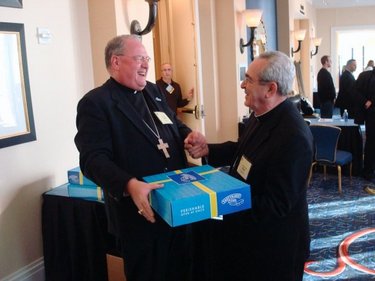It turns out the U.S. bishops may soon be deciding the answer to that question.
From David Gibson at Politics Daily:
In remarks at the opening of the hierarchy’s annual meeting in Baltimore, Chicago Cardinal Francis George made it clear that after years of repeated questions about the bishops’ credibility, it was time for the bishops to clarify just who can and cannot speak for the church. He also confirmed that he had set up three committees of bishops to develop guidelines for determining what will be considered legitimate Catholic entities.
“Since everything and everyone in Catholic communion is truly inter-related, and the visible nexus of these relations is the bishop, an insistence on complete independence from the bishop renders a person or institution sectarian, less than fully Catholic,” George, president of the United States Conference of Catholic Bishops, told some 300 of his fellow bishops. “The purpose of our reflections, therefore, is to clarify questions of truth of faith and of accountability or community among all those who claim to be part of the Catholic communion.”
George’s address followed a tumultuous year that saw both lay Catholics and many bishops sharply and publicly divide over almost every newsworthy development: the election of Barack Obama, the role of Catholics in public life, hot-button issues such as gay marriage and health care reform, the independence of universities such as Notre Dame, the freedom of theologians to speak and publish, and even the question of whether Ted Kennedy deserved a Catholic funeral.
Church insiders said the divisions and open dissents, and the criticisms that often bombarded the bishops from right and left, increasingly frustrated George and others in the church leadership, and led George to quietly form several committees that will try to find a way to certify which universities, media, and other organizations can claim to be Catholic.
Setting the tone for his argument for episcopal control, Cardinal George prefaced his remarks by twice citing the 2nd century bishop, Ignatius of Antioch, who famously wrote to his flock “that you do nothing without your bishop.”
“Your submission to your bishop, who is in the place of Jesus Christ, shows me that you are not living as men usually do but in the manner of Jesus himself,” Antioch wrote in a citation noted by Cardinal George.
That elevated view of the bishop’s authority guided George’s remarks. For example, he made it clear that even the recent years of crisis would not cow the bishops in their effort to reassert their authority and relevance.
“There are some who would like to trap the church in historical events of ages long past, and there are others who would keep the bishops permanently imprisoned in the clerical sexual abuse scandal of recent years,” George said. “The proper response to a crisis of governance, however, is not no governance but effective governance.”
Check out more right here.

